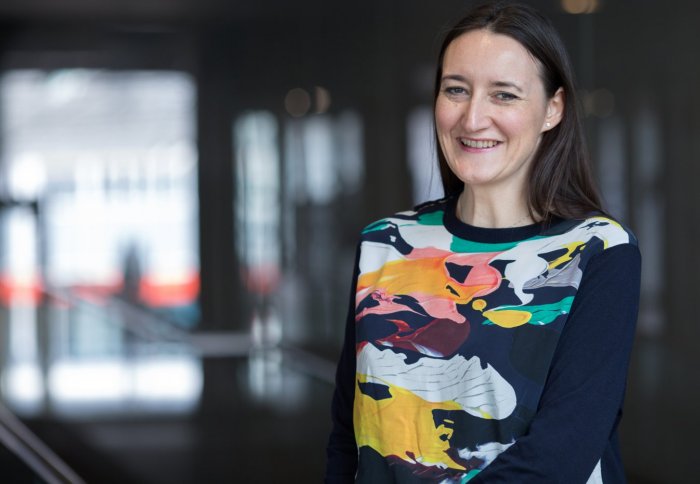Imperial institute at intersection of engineering and molecular science opens
by Colin Smith

Professor Claire Adjiman says molecular science is an exciting frontier, offering countless opportunities.
A new institute at Imperial to fast-track the development of molecular engineering research officially launches today.
The global challenges faced by the world, such as reducing harmful emissions and fighting the spread of infections, are changing the way that researchers are working. These complex problems require collaborations that bridge many disciplines. To solve them, research needs to done at all levels, from the molecular scale right up to understanding whole industrial systems.

Professor Nic Harrison, IMSE Co-Director, says the Institute will bridge the gulf between engineering and molecular science
The Institute for Molecular Science and Engineering (IMSE) aims to accelerate the pace of development of this field of research. At IMSE, understanding how molecules interact with one another will play a central role in engineering new products and processes. The aim is to spur new discoveries and innovative industrial applications.
The IMSE will bring together researchers from a diverse range of specialisms to collaborate on grand challenge projects and to network through a programme of seminars, workshops and symposia. It will connect them with academia, industrialists and policy-makers, as well as researchers from other academic institutions.
Professor Claire Adjiman, Co-Director of IMSE, said: “The boundary between molecular science and engineering is an exciting frontier that offers countless unexplored opportunities. The world cannot solve the complex challenges we face if we work in isolation. Forging diverse partnerships will mean that grand challenges can be solved by tackling them from many different directions at once.”
IMSE will also act as a bridge to maintain and facilitate strong links between researchers at the South Kensington Campus and the growing number of researchers at Imperial’s White City campus. This includes those who will be located in the Molecular Sciences Research Hub when it opens.
IMSE will focus on developing three key areas, including advancing research at the interface between molecular science and engineering, delivering an educational programme for postgraduates and enabling the translation of research into industrial applications.
Advancing research
The IMSE is currently holding workshops with academic teams from across Imperial and industry. They are exploring potential grand challenge projects, drawing on the expertise of more than 60 affiliates that have joined the institute to date.
Developing surfaces that prevent the growth of harmful bacteria is a major challenge that IMSE affiliates are keen to work on. Already, Dr Myrsini Kaforou, from the Department of Medicine, is using new methods and software tools for understanding biological data to shed light on bacterial infections in humans and aid quick and accurate diagnosis. Dr Gerald Larrouy-Maumus, from the Department of Life Sciences, and his team are using measurement techniques at the molecular scale to advance our understanding of how bacteria adapt and attach to surfaces. Progress in these areas could help researchers to engineer better surfaces through the development of new coatings or patterned surfaces that hinder bacterial growth.
Educating the next generation
The Institute is developing a bespoke Masters in Research degree (MRes) in Molecular Science and Engineering, which will be unique in the world. Students will have the opportunity to pursue an industrial placement as part of the research component of the course, gaining an in-depth understanding of an industrial challenge and how it relates to academic research. The course will equip students with skills that will enable them to embark on a PhD or career in industry. Staff at IMSE are working closely with industry to develop the programme and the first intake of students will be in 2017.
Professor Nic Harrison, Co-Director of IMSE, added: “We have listened to industry. They are saying that we need to bridge the gulf between engineering and molecular science in order to tackle some of the world’s grand challenges. We need to create a common ‘language’ that enables tomorrow’s researchers in molecular sciences and engineering to work effectively together. The MRes in Molecular and Science Engineering is the first course of its kind in the world and we believe that it meets a pressing and important need.
“Imperial is ideally placed to lead this ambitious programme – it is at the forefront of research in relevant disciplines with a critical mass of activities across the board, it has a strong culture of collaboration, and a well-established close association with industry.”
Industrial translation
The IMSE will also be working closely with industry to shape the Institute’s research directions. For example, IMSE has already held a co-creation workshop with the manufacturer BASF, the world’s largest chemical producer. Twenty five academics from Imperial and 12 BASF researchers explored the potential for long-term collaborations around two grand challenges.
Article text (excluding photos or graphics) © Imperial College London.
Photos and graphics subject to third party copyright used with permission or © Imperial College London.
Reporter
Colin Smith
Communications and Public Affairs